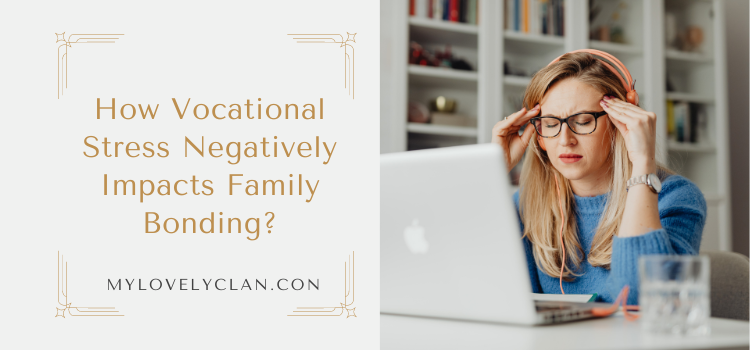Vocational stress, also known as work-related stress, refers to the negative physical and emotional responses that can occur when the demands of a job exceed a person’s ability to cope.
This type of stress can have a wide range of negative impacts on an individual’s overall well-being, including physical health problems, mental health issues, and difficulty with personal relationships.
Also Read: What is Family bonding? How to Have a Strongly Bonded Family?
Impacts of Vocational Stress on Family Bonding:
Vocational stress can have both short term and long term impacts on family bonding.
Short Term Impacts:
Decreased communication and quality time spent with loved ones: When individuals are experiencing high levels of stress at work, they may be less inclined to engage in meaningful conversations or activities with their loved ones.
Increased tension and conflicts within the family: Stress at work can lead to individuals bringing that stress home with them, leading to increased tension and conflicts within the family.
Decreased participation in family activities: Job stress may lead to individuals working long hours and having less time to devote to their family, resulting in a lack of participation in family activities.
Feeling of disconnection from loved ones: The decreased communication and participation in activities can lead to a feeling of disconnection from loved ones.
Short-tempered and irritable behavior: This occupational stress can also lead to individuals becoming short-tempered and irritable, which can ultimately lead to misunderstandings and further strain on family relationships.
Long Term Impacts:
Breakdown of communication and relationships within the family: If not addressed and managed, vocational stress can lead to a breakdown of communication and relationships within the family.
Decreased satisfaction with personal and family relationships: Over time, the negative impacts of occupational stress can lead to decreased satisfaction with personal and family relationships.
Decreased overall well-being and quality of life: The negative effects of stress can have a cumulative impact on an individual’s overall well-being and quality of life.
Physical and mental health problems: Prolonged stress can lead to physical and mental health problems, which can further impact family ties.
Difficulty maintaining personal and professional responsibilities: High levels of job stress can make it difficult for individuals to maintain their personal and professional responsibilities, which can further strain relationships with loved ones.
How to Cope with Vocational Stress?
There are several strategies that a person can use to cope with vocational stress and minimize its impact on personal relationship:
Seek support from loved ones: Sharing your stress with loved ones can help you reduce your feelings of isolation and also provide emotional support.
Seek help for managing stress: Consider seeking professional help, such as therapy or counseling, to learn coping strategies for managing stress.
Set boundaries: Make time for activities that help you relax and recharge, and set boundaries around your work time to protect your personal time with loved ones.
Practice self-care: Engage in activities that promote physical and emotional well-being, such as exercise, meditation, or hobbies.
Communicate with your family: Open and honest communication can help reduce tension and conflicts within the family and improve relationships.
Seek work-life balance: Look for ways to better balance your work and personal responsibilities in order to prioritize your relationships with loved ones.
Find healthy ways to cope with stress: Engage in stress-reducing activities, such as deep breathing, exercise, or mindfulness practices.
By utilizing these strategies, individuals can effectively manage their vocational stress and maintain strong connection with their loved ones despite the demands of work.
Conclusion:
It is important for anyone to address and manage work-related tension and burden as early as possible in order to minimize its short term and long term effects on personal life.
We at MLC are always bridging more and more valuable contents related to strong family bonding. Please be our voice and share this article within your connections and don’t forget to share your thoughts in the comments below. 🙂
Keep Learning: 8 Reasons to Make Family Bonding a Priority in Your Life

